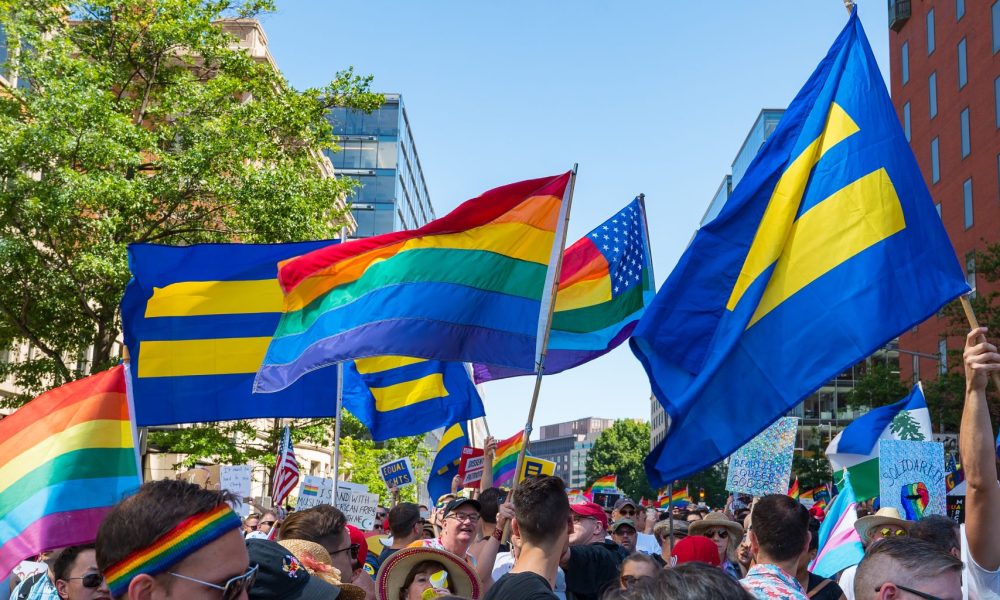The fashion-forward series “Read All About It” reclaims headlines and turns political attacks into moments of trans triumph.
Timed perfectly with the federal court’s move to block the Trump administration’s passport restrictions targeting transgender Americans, queer-founded fashion label FINESSE is making headlines of its own. The brand just launched “Read All About It”—a four-part, satirical Pride campaign that calls out some of the year’s most egregious anti-trans laws by giving them a makeover.
With a lineup of trans Gen Z It-Girls at the helm, each starring in and co-directing their own video, the series reclaims power with humor, glam, and radical authenticity.
Headlines, But Make It Trans and Talented
The Read All About It series transforms some of the most politicized moments for the trans community into fashion-forward mini-films. Each segment highlights a different flashpoint: bathroom bills, military bans, sports restrictions, and the infamous passport policy.
And the dolls are not just starring, they’re co-creative directing every scene. FINESSE worked closely with its trans cast to ensure each story was told with care, flair, and full approval through multiple rounds of feedback.
Episode 1: Zaya Perysian vs. Passport Erasure
Leading the charge is Zaya Perysian (@zayaperysian), who made headlines earlier this year after winning a legal battle against the Trump administration. In February, a State Department directive attempted to block the use of “X” gender markers on passports. Zaya fought back, and won.
In the campaign’s first video, Zaya reenacts and reclaims that policy through an empowering, tongue-in-cheek visual retelling. Known for documenting her transition and being named a TikTok LGBTQ Trailblazer, Zaya is proving once again that she’s more than a viral moment, she’s a movement.
View this post on Instagram
Episode 2: Ve’ondre Mitchell Calls Out the Military Ban
Next up is Ve’ondre Mitchell (@veondre), a GLAAD “20 Under 20” honoree and former Human Rights Campaign Youth Ambassador. In February, the Department of Defense banned those with a history of gender dysphoria from serving unless they met strict waiver conditions.
Mitchell brings the absurdity of this decision to life in her episode, blending military chic with scathing satire. A proud advocate and musician, she also just dropped a new single, “Gay,” timed perfectly with the campaign’s release.
View this post on Instagram
Episode 3: Stella Menino Takes on Florida’s Bathroom Law
Stella Menino (@stelluhb), a TikTok star with nearly 60 million likes, brings her signature humor to a sobering topic. In March, Florida enforced its first anti-trans bathroom law, leading to the arrest of a trans woman at the state capitol.
Stella’s video pokes fun at the twisted logic behind these so-called “safety” policies, using comedy and camp to highlight the real threat: state-sanctioned discrimination.
View this post on Instagram
Episode 4: Dialló Mitch Dismantles Trump’s Sports Order
Rounding out the campaign is Dialló Mitch (@__mystylist), a model and stylist known for pushing boundaries in fashion. Her episode tackles Trump’s executive order “Keeping Men Out of Women’s Sports,” which redefined Title IX to exclude trans girls and women.
Dialló, who describes her style as “fearless, risky, and expressive as f*ck,” takes on the policy with runway-ready athleticism, pushing back against transphobic tropes with elegance and edge.
View this post on Instagram
Resistance in Rhinestones
With “Read All About It,” FINESSE is reminding us that protest can be bold, beautiful, and hilarious. By blending satire, high fashion, and trans-led storytelling, the brand isn’t just responding to political attacks, it’s rewriting the headlines entirely.
And in a time when the trans community is being targeted across legislative fronts, the message is loud and clear: the girls aren’t going anywhere, but they might show up in full glam to read you for filth.


